Taking up horse riding may be challenging, hands down. That’s why we decided to give a helping hand to those who have just started. We asked professional horse riders, trainers, and breeders to give their valuable advice to get up on a horse.
Here are the questions we kindly asked the horse experts:
- What’s the most valuable piece of advice you’d give for beginner riders?
- How to involve children in equestrian sports?
- How to start riding if you’re afraid of getting on a horse?
And here are the top-notch tips we received. Hope these guidelines will help new riders to get started with flying colors!
Christina Christensen
Certified Instructor of the British Horse Society and the Certified Horseman’s Association
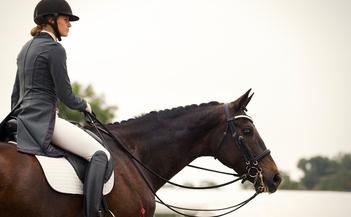
- Find a reputable trainer with a specialty that you have an interest in. There are also certifications that you can look for to help you identify someone who has completed training for their industry (i.e.: international certifications like the Bereiter Program or the British Horse Society, and national programs like the USDF medals, CPHA, USEF Coaches, etc.)
- Involving children is the easy part! As long as you make it fun and safe, and I think kids are naturally be drawn to animals. The benefits of experiencing empathy, companionship, and the life skills that develop while bonding and communicating with animals is unmatched, especially at a young age.
- If you are afraid of riding a horse, then don’t get on one! Take some lessons on horsemanship: grooming, leading, lunging, learning the body language of the horse and also body language that a human uses to communicate with a horse. If you grew up around horses you would have years to develop those skills, but if you are “new” to horses there is no benefit to skipping these fundamentals. One of my biggest challenges is when riders come to me thinking they are competent at riding despite having no idea how to understand the horse and all of the subtle cues they are giving all of the time. If a rider can’t understand these cues, how can they possibly be effective undersaddle? Every great equestrian will smile as they recount the bond they formed with their most special horses, and that requires good horsemanship skills. Don’t skip this step! Instead, make it a priority.
650.743.9654
Joe Camp
Film writer, producer, director, author, and passionate speaker
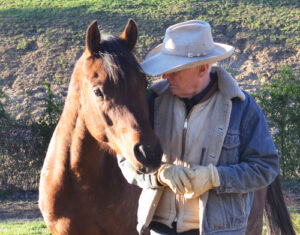
… as it happens I’m currently working on a book entitled Promises Made to Our Horses – For Beginners Only. And there are no short answers. I’ve written entire chapters on your questions 1 & 3.
In a nutshell answer to #1 is if you are a beginning rider, do not start on your own horse(s). Research a GOOD riding trainer who owns horses good for beginners. Go to that trainer and learn everything he/she knows before you ever even think of climbing onto your own horses. Especially if you are afraid of getting onto a horse.
And for the latter, after you have learned everything that the trainer can teach you about riding, then bring that trainer to your place for your first attempt with your own horses. And don’t ever even get close to your horses when you are afraid. Your horse knows that you’re afraid and he or she will then also be afraid.
And above all: Love the horse before the sport.
At last! A treat that is actually good for your horse!
Patience Prine-Carr
Owner and manager of
Glynnsong Farms
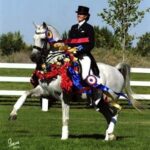
- To realize you are always learning and never know it all. Never be afraid to ask for advice and to enjoy the journey but also make goals that are attainable.
- Invite schools to visit your farm or give group day camps. Take your horse to a school for a demo. Host birthday parties.
- Teach them how to interact with the horses on the ground such as grooming, leading and just being around a very gentle horse. Have them watch other people ride and see how fun it is. Make sure the horse fits them and has a tall mounting block that is easy to get on. Soon the desire will come. Never overface them by doing something too hard or they are not ready for.
(20+) Glynnsong Farms | Facebook
(20+) Encandescent FEI Purebred Arabian-Oldenburg Approved stallion | Facebook
(20+) NATIONAL CHAMPION WP AULSOVAIN++++// | Facebook
831-238-6559
Kip Mistral
Lifelong horsewoman
What I would have to say on these subjects are all the same thing…the most important thing to me is that the people who take up “horse riding” need to really love horses and learn a lot about them. Most amateur riders just want to get on and ride like they get in their automobiles and push down the accelerator. Horses are very sensitive, intelligent and very generous and it is easy for unconscious people to just employ horses for their own purposes and not bother to get to know them or fully appreciate them. Most of the horse owners at the barn where I board my horses know almost nothing about their horses and actually abuse them without knowing that they are doing it. Or caring, it seems, because they are told there are problems with their horses and do nothing to help them. What I would have to contribute would be thoughts about the ethology of being with horses which must come before people think they have any business “riding” horses.
Shawn Gannon
Host of French Broad Outpost Ranch
- AVOID using the standard Centered Riding System. It fails over 50% of new riders although it’s the primary system that is taught worldwide. Study the Law of Physics for the correct position past the walk and keep your toes up to restrict your instincts instead of “keep your heels” down which engages your instincts. Once again heels down is taught routinely by the standard system yet it fails the majority of riders to ride at ease.
2. Refer to #1 and they will learn to love horseback riding because they will feel safe.
3. Once again refer to #1. Fear is from being out of balance. Balance is rarely achieved by most horseback riders. They may have it on and off but not 100%. The Centered Riding system is why it is so difficult for new riders and often they just quit because of their fear. Over 50% of new students before the 1st year is over will quit taking lessons because they can’t get into balance and the system itself causes this problem.
Alyssa Mathews
Lifelong equestrian and
horse lover, founder of
DiscoverTheHorse
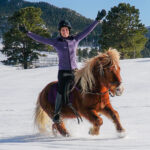
-
Remember that everyone starts out as a beginner, we have ALL been where you are now! The basics that you start out learning will be the foundation for the rest of your equestrian journey, so enjoy this time and do your best to learn as much as you can! Take lessons, practice, read books, watch videos, have someone film you riding- then review those videos! Have fun and enjoy every ride!
-
I started riding lessons when I was five years old and those lessons helped shape me into who I am today! Finding a riding instructor with well-trained school horses is a great way for children to get involved in equestrian sports. This will allow them to learn the basics of horsemanship including ground work, grooming, basic handling and getting started with riding.
-
If you are afraid of riding, you can start by learning about horses and getting to know them on the ground first! This will help increase your confidence and build your understanding of how to communicate with them. With a well-trained and calm horse, have someone show you how to groom them, learn about how horses respond to pressure, learn how to lead them and back them up. Get to the point where you are comfortable being around them first, then have an instructor help you with your first ride.
Callie King
Founder of HorseClass
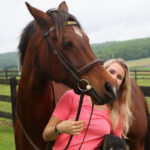
Callie kindly shares her articles that can help new riders get enlightened. Check them out:
- Most Common Mistakes Made By Beginner Riders
- Dealing with the Unknown – Lessons from Learning to Ride
- 5 Tips for Great Riding Posture
Barclay Tagg
Experienced trainer
-
To start, I’d advise children to be at least 8 years old to start with riding lessons, if they are NOT raised with farm animals. This gives them a chance to have the strength and coordination it takes to ride. If they are born on a farm and raised with horses they will have done this at a younger age and would be more advanced at 8 years old and probably not considered a beginner.
-
I think taking children to any horse sport is good. Find the closest place that has races, polo, horse activities even rodeos. Find people or places that involve kids in horse activities. IE: camps, family day at the races or just local farms that would allow children to interact with horses.
-
First and foremost they must be comfortable working around them (brushing, picking feet, tacking them up etc) before they try to ride. Once they establish that they are comfortable on the ground, then they can try to gain confidence on top of them. Start in a very controlled space. Take baby steps while learning not to be afraid, and tell them to ask GOD to be with them in the saddle.
In addition to all of this, I would instill that the parents do their due diligence in finding the “right person” for their children’s needs and wants.
Maria Katsamani
Horse trainer, clinician, exhibition rider, and author
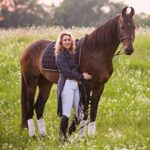
- I think it is very important to align with an instructor who will take their time to explain the basics of balance on a horse and who will put you on very safe and seasoned horses. It is equally as important that you align with someone that will help you appreciate the bonds we can make with horses.
- Some children are not interested in the sports aspect of being with horses. To keep kids interested in horses it may be best to keep their options open. Usually, the competitive part will evolve when children are in a barn with other children their age. Inevitably, they will be exposed to the option of sport, but without the pressure from an adult.
- Cows! Many times I recommend finding a rideable cow that is slow moving to get someone used to being atop a moving animal. Another tool that is helpful is the use of an Equicizer. I use it in my lesson program and it helps people understand the mechanics of sitting on a moving object.
Tara Gandomcar-Hieb
Owner and manager of Cottonwood Riding Club
-
Stick with it! Horseback riding is fun but different than anything you have ever tried before. Other sports utilize skills we already know. Running, jumping, hand eye coordination etc. Riding is totally different. You balance on your heel! What! That is totally backward of what we do every day. If you are uneven from the left to the right side you not only throw yourself off balance but also your horse! When does a soccer player have to think about the balance of a ball! You use small muscles that are hardly ever used. So you get tired and sore in places you didn’t know you had. But if you stick with it you can create a lifelong passion that can take you well into life. It is one sport where men and women are equal at all levels so it is a great total family sport. Plus it is a sport that requires complete mental focus. Making it a great sport as well as therapy. Not to mention the bond you get back from your horse. Soccer balls and golf clubs can’t do that.
-
What a silly question! All kids are excited about horses. All you have to do is expose them to it! We have kids here from all walks of life. They all love to just come and hang at the barn. Eventually, they get involved.
-
Horses are large and can seem scary! Many people who own horses are actually afraid of other people’s horses. The best advice I have is to breathe! work on what you can and give it time. The horse will wait for you to be ready.
Kimberly Clark
Head trainer and rider at Leighton Farm
-
Be willing to change trainers if you stick with it. You must begin on lesson horses so you can adjust to the feeling and movement of riding but if you stay on school horses, you will not progress and really learn to ride. School horses will do what you want whether you ask correctly or not. Once you get a foundation you must then ride horses that mirror your riding exactly – giving you what you are truly asking for so you will receive instant feedback from the horse and then can correct your aids. Moving on to new trainers with different horses provides more horses to learn from and hearing the fundamental principles said in a different way.
-
Volunteering. If they show the commitment to work around and learn about the horses, then move on to learning to ride. This aspect is missing in many of today’s youth.
-
Volunteering or working around horses to learn about and understand them so you will be more comfortable around them. So many kids nowadays begin riding at a lesson barn where they don’t work with the horses. They just show up, have their lesson and then leave. A better way for everyone is to work around them and then start riding. Once you know how they behave and react, you are bound to be more comfortable. If you don’t have the patience to lay some groundwork, you probably don’t have the patience to ride anyway.
Jemma Sizelove
Experienced horse rider
I was fortunate to grow up riding, and my first pony was a very naughty Arabian. She taught me a lot!
Over the years, here are some tips I might give to a beginner rider.
To be honest, advice is probably lost on most people, and especially kids. It’s our own experiences with horses that give us the joy and confidence to come back for more. If I had to reimagine that I’d never ridden before, and I was just getting into the sport, I’d probably want less advice and for someone to give me a good pony and a gaggle of girls to go ride with! There’s so much red tape on sports these days, and I like to think that riding horses is one where kids learn to have the independence and the responsibility that comes along with caring for and riding a horse. It’s definitely a labor of love, and it’s usually not until I’ve left the barn and am at home that I look back and realize how much fun all that work was. So if I had to give some valuable advice, I’d say…
- Don’t just show up and ride the horse, be involved in the care (brushing, tacking up, cleaning stalls). The work you put in will make you appreciate the ride.
- Get out of the arena and ride with friends! I’m talking horse camp, group lessons, lots of trail rides.
And for kids who might be scared? Don’t give them training wheels. Give them a good pony and let them figure it out. It’s when we hand-hold and over protect these kids that they are too distracted by our antics to actually ENJOY what they’re doing! Don’t hover. A scared kid is like a scared horse. Keep their brains busy, give them lots to do and challenge them.
(770) 596 8927
Jena Antonucci
Lifelong equestrian and horse lover
- The most valuable advice I would give is to breathe! Having the opportunity to create that kind of bond with a horse is a gift! Know that you are not going to master it in a day and know that you are going to use muscles you didn’t even know existed! Riding is a journey! The time spent on the ground is equally if not more important than the time you will spend on their backs.
- This is tough as it seems increasingly more difficult to do equestrian sports affordably. I do feel volunteering time at equine adoption facilities or handicap programs is an excellent opportunity for children to get involved and introduced to equestrian sports. While the kids can’t be too young to volunteer, exposing kids to what a horse can do and what we can do for them is an excellent opportunity.
- I feel you need to specifically identify what the ‘it’ is that one is scared of. Sometimes I have found when you can pick it apart and truly identify what the fear is you are able to work through it. It is easy to say in one broad stroke you’re afraid to ride, but what is ‘it’? Once you have worked through the mental part it is about finding a great school master who will help build your confidence and take it at your pace.
Janet Del Castillo
Experienced horse trainer
-
Valuable advice: it’s very important to learn how to ride with a competent teacher. The basics of horsemanship, from grooming to feed etc go along with actually riding. The more you understand all aspects of the horse the more success you’ll have in this wonderful experience.
-
Children should read books about horses and dream of riding and caring for them. The opportunity to volunteer at a rescue or a local stable is a good beginning. Kids who have the affinity for horses will want to do anything related to their upkeep.
-
The third item … get comfortable with working around Horses … brushing , cleaning hooves, general handling , will allow person to gain confidence
And hopefully eventually want to try riding. At that point they start the process of getting on.
Silvia Rizzo
Horse trainer and
Co-Owner at HOF MARABUNTA
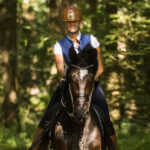
-
The most important tip for someone who wants to start riding horses is to choose a stable that is well rated and specializes in the type of horses and trainers who have experience with beginners. Horse riding is a beautiful sport but starting to ride with the right people will make your passion for the sport grow in the right direction.
-
Children must first learn to know, love, respect and not be shy in front of a horse before riding it. After this step, they can begin to ride, certainly the ponies or a horse suitable in the proportions of those who want to ride, with a trainer who knows how to teach but at the same time making them having fun.
-
I have already answered in the previous question, but certainly, if someone is more fearful or shy you have to give him the time, do not rush him and use a little ‘psychology to make the fearful person, much more confident of the horse even when it is on the ground so as to make him become a good and reliable playmate.
hofmarabunta.com
[email protected]
IG: hofmarabunta
TikTok: silviarizzo3
Kirk Kamish
Horse trainer and Owner at My Highland Horse Farm
-
Always wear a safety approved helmet.
-
Summer camps-Day camps-riding lessons-Bday parties/social events at our farm with our petting zoo. Free range farm rides.
-
Start out with visits to hang around them a bunch. People usually are required to pay a small fee. We charge a 15.00 facility/petting zoo fee.
Samantha
Horse trainer at Rugged Cross Performance Horses LLC

-
Relax, stay calm and have fun! Don’t take it so seriously because you won’t be perfect right off the bat!
-
Get them a horse that keeps them confident and not scared, you want the kids to have fun and build them up. Keep them happy and confident in themselves and with their horse.
-
Spend time around them, learn them from the ground up, watch how they behave, horses speak through body language with each other and us. Be confident around them on the ground and the saddle time will come easy.
rcphorses.com
Coleman Swanson
Horse trainer at
Sioux River Horses
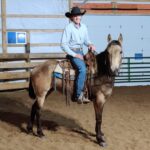
-
It’s important to find someone who is willing to TEACH – someone who can be hands-on and work with them and their horse. The trainer needs to be with you. Be certain they are reputable. It’s also important for people to learn there is more to ‘riding’ than just riding.
-
Find a reputable training barn qualified instructors who have proper safety measures and guidance in place to teach the foundations basics – teach simple, keep safe, and provide good lesson horses.
-
Start with the basics – find a qualified place that allows you or the child to come out and spend time with horses – learn about their care, feeding, needs, etc. When it comes time to learn to ride – again, take your time – and don’t feel pressured. Riding a horse requires a solid foundation so it is important to find someone who will be patient and teach correctly to help build your confidence.
There are lots of people out there who know a LOT, but don’t want to teach or be with people ( prefer to be with horses) and there are a lot of people who want to teach but don’t know enough to teach correctly… Take your time and find someone who is qualified and reputable so you get off to a great start! Foundation is key.
(605)906-2319
Ruth Gifford
Marketing Manager, Syndicate Manager at Nick Gifford Racing Club
-
Go to a BHS approved riding school with a chief instructor BHSI or BHSI running the place.
-
Start with private 1-1 lessons to begin with at the BHS approved riding centre and when they say you are ready move to a group lesson / hacks.
-
If your afraid of getting on a horse but really want to ride see the above two answers. Tell them you are nervous and they will provide an appropriate horse.
Kevin Frost
Experienced horse trainer
-
Be brave, confident and allow yourself to learn.
-
Other equestrian sports need to take a leaf out of racing’s book. Racing arranges school trips to the races; children get to see behind the scenes, walk the track, meet the jockeys etc. Other equestrian sports need to adopt the same approach.
-
Go to a reputable instructor who has the right sort of horses for beginners to learn on. Remember, that just because a horse is small it doesn’t mean it’s going to be quiet, a lot of large horses have placid temperaments (depending on the breed) and anyone who is genuinely frightened then riding may not be for them.
Jackie Harris
Horse trainer at
Harris Horses
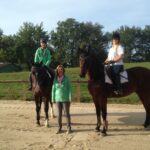
-
Find a good riding school… go and watch a few lessons. Look at the horses, check out the facilities, and talk to the staff and instructors. See how interested they are in you. As a beginner, the key to progressing is time and quality instruction on calm, well trained horses. As you learn the correct technique, and how to communicate with your horse, it’s vital that the horse does respond to your instructions. So although you don’t require too much energy – as you won’t know how to control it at first – you do need to feel the horse take you forward willingly when you ride correctly. Some riding schools will have sessions where they allow clients to help groom and tack up/untack the horses, sign up as soon as you can and learn how to handle the horse from the ground. This is so important to begin to understand how horses like you to be when you are around them. This is the key to becoming a horse person, and a better rider.
-
In my experience, children tend to fall into 2 categories. The first love the ponies as a cuddly friend, they will spend hours grooming, plaiting, oiling feet and generally just being close to them. Sometimes these kids can be more timid riders, or simply don’t really ask much of their furry friend. They may prefer to go out on hacks with other similar riders, or just enjoy low key lessons in the arena. The 2nd category are the competitive ones… Riding is like everything else in their mind, it’s to do stuff that is exciting. They don’t waste time with unnecessary preening, they get up and on and away. They want to canter in their first lesson, they want to jump as soon as possible. They want to play polo or go jumping cross country. Teaching these kids is a dream and a nightmare! They need to learn to sit correctly and to ride with the correct technique but get bored doing circles…They want to jump higher but need to understand the limits of their pony. These children are the competitors of the future, so their enthusiasm must be nurtured, and encouraged. The Pony Club offers lots of opportunities to get out competing, in a safe and organised environment. But they do vary, so it’s important to do a little homework before deciding which Club will suit your child. A keen parent with some transport can research local competitions, dressage, show jumping and Cross- Country, and take their kids out and about. There are a number of really excellent show centres that run all levels of competition. You can often hire these facilities and go with an instructor for 1 on 1 training and practise. So on the final, vital ingredient… when your competitive child is developing – find a good trainer, this is not an easy job for a parent.
-
If you are determined to learn to ride, but nervous of the horse or getting on it, you need to first overcome any fear of the animal. To get close up and personal requires finding somewhere or someone who has time for you to do this. Find a professional person and stables to go to, where they are very knowledgeable. You need to be allowed to brush, feed, and generally learn how to handle a kind and gentle horse from the safety of your own 2 feet. A pony or a small horse is best – the physical size is not so intimidating. Spending time with 1 particular animal will start a bond and trust, which works both ways. Watching someone else ride your new friend will let you see how the horse behaves when ridden, and give you the confidence to try it for yourself. The practical things to do are make sure you have the right equipment, comfortable riding trousers or jogs, safe boots and a good quality riding hat. A quality stable will ensure that you mount from a mounting block and that the horse stands perfectly still. They will probably provide a neck strap for you to hold on to, if not ask for one. You will just be led around to begin with, so the instructor is close and can give you confidence. The first few sessions are the most important – the beginning of your riding career!
Suzanne LaPorte
Experienced horse trainer
-
Make sure you find a trainer and a beginner lesson horse that you are comfortable with and gives you confidence along with making the experience fun for you! Building confidence on and off the horse is a must, finding a reputable trainer that can fit you with a well schooled beginner lesson horse is very important! Do your research and learn as much as you can about horses before you start this adventure.
-
Barns that offer summer camps with kids of all ages help to encourage kids to get into riding, and adds in fun horse activities and games for them to participate in around the barn and with the horses!
-
Spend lots of time around the barn and work on the ground with safe horses to build a relationship and confidence with them, make sure you vocalize you’re fears with your trainer and they should take the correct steps into helping you move pass your insecurities And build you mentally and give you enough knowledge to have the courage to take that next step!
John Berry
Racehorse trainer at
Beverley House Stables
-
Regard the horse/pony as your friend and be confident. The horse/pony will respond in kind to how you greet and treat him. Treat him like a friend and he’ll be your friend. Treat him like an enemy and it won’t go so well. And if you act confidently, he’ll be reassured; if you act nervously, he’ll be on edge too.
-
Encourage them to regard ponies as friendly animals they can have fun with, like dogs and cats.
-
Trust the person who is teaching you to ride (and trust the horse – see point one). The person who is teaching you to ride won’t over-face you. He or she will only get you doing the things that you’ll be able to do safely, so have the confidence and trust to follow their instructions. The more confidently you follow them, the safer you’ll be. And the better the horse/pony will go for you (see point one).
Charlie Fellowes
Horse trainer at
Bedford House Stables
-
Confidence is everything. Horses are very intelligent animals and they can tell when you are scared. If you relax and act with authority, the horse will do the same.
-
Horseriding can often be an expensive past time. Horses aren’t cheap to buy or keep and anything that comes with them tends to cost money. If we could make them more accessible through riding schools etc that would be a start.
-
Riding schools are brilliant. They have all different types of horses that suit all levels of experience. They will teach you the basics and get you on your way.
Let the Adventure Begin!
Hope these useful tips will come in handy. Share this article with your fellows to help them get started.
If you’re an equestrian rider passionate about what you do, feel free to contact us to share your piece of advice.
